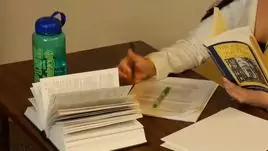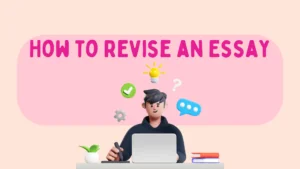

✅ AI Essay Writer ✅ AI Detector ✅ Plagchecker ✅ Paraphraser
✅ Summarizer ✅ Citation Generator
A term paper is usually assigned to students as a research assignment that covers most of the material given over an academic term: a semester, or a whole academic year. It is used by examiners and instructors to estimate how well a student has understood, researched, and incorporated the set material and activities associated with the course.
How an instructor or lecturer determines what is meant by a term paper is usually their choice, since the expression is a loose one that may or may not involve extensive research, and may or may not cover all the work in a semester or ‘term.’
Stages for Writing a Term Paper
- Selecting a subject or topic is usually the first step. This is either set by the instructor or chosen from a short list by the student.
- Seeking materials associated with the topic in journals, articles, books, and websites is usually the next step in the creation of a term paper.
- Reading the material to gain understanding, and taking copious notes is a good practice.
- Writing a solid outline based on the notes is the next step.
- The first draft of the central part, or body, of the term paper comes next.
- Devising a fitting conclusion that summarizes the findings follows.
- The hardest step is writing the introduction, which must include a good thesis statement.
- Reading, editing, and proofing comes last.
Topic Selection
Depending on the subject being studied, students can choose excellent topics on which to base a term paper to demonstrate how well they have understood the work or research covered during the term. Science, arts, business, communications, and engineering subjects all provide absorbing topics that can be used, but care must be taken to devise a topic that engages most of the material studied in a comprehensive way. Term papers are important when it comes to grading a student’s progress, so a term paper must showcase as much ground covered as possible.
A good example can be taken from a student researching primitive and early art during a semester in an arts course. A good topic would be “Religious Art: Primitive Icons of 9thth century AD.” A good topic for a chemical engineering term paper might be, “Redesigning the Manufacturing Process of Analgesic Tablets.” An excellent topic for a literature term paper might be, “Epistolary Literature: Authors Writing to Authors.” These topics are specific to their subject, but they are general enough to allow the student scope for extensive research and comprehensive reading and writing on the topic.
Key Points to Consider
-
-
- Assemble all the materials before starting to read and take notes. Keep all applicable books together, and mark the passages and pages of relevant material. Card systems do work for some students—others like to open a word processing folder and type the notes. These are then easily reworked into paragraphs.
- Remember that facts and figures are more important than ideas and opinions. Remember too that all facts and figures must be supported by properly formatted referencing, using APA, MLA, or Chicago/Turabian styles.
- A self-devised note-taking system is best. It will help to keep notes and cuttings in order. The less confusion and fragmentation the better: organization is valuable, and time-management skills come into play.
- It is important to use effective writing techniques in a good term paper. Three basic persuasion techniques are: use facts and evidence, apply logic and reason, and appeal to the intelligence and emotion of the reader. Combine the three to create valid points.
- Each point can be built into a paragraph, using notes and paraphrased material from sources such as books, websites, articles, videos, audio files, and websites.
- The main points must be combined with minor ones to contribute to the overriding premise or thesis. Each paragraph can lead with an important point, then proceed to explain it, and then introduce a minor point closer to the end to support the initial statement.
- Deciding on a writing style is not difficult: your writing must be semi-formal, academic, and precise: do not fall into the habit of using conversational language, since it is inappropriate for a work as important as a term paper.
-
Dos and Don’ts
Dos
|
Don’ts
|
Common Mistakes
-
-
- It is a mistake to build an argumentative essay in place of a term paper, which should be mainly based on research and the ground covered over a long period of study.
- The most common mistake found in term papers is using all new material rather than the set texts or reading material used during the period covered by the term.
- It is not wise to change arguments as the paper develops. A stance or opinion should be maintained throughout, and demonstrated with material used during the term. It is perfectly acceptable to show both sides of an argument, but care must be taken not to write down an entire debate instead of demonstrating knowledge of material.
- A frequently seen flaw is rushed or unprepared writing. Research all the material thoroughly, making sure the notes you write are clear and cogent, and create paragraphs of well-prepared writing, steadily and surely. Hesitation is another aspect that weakens an otherwise well-researched paper: take a stance and sustain your position.
- A lack of structure or a missing central premise is often found to weaken a student’s work. It is important to make a plan or outline for a successful term paper. Randomly listing facts, arguments, and data found in literature without organizing it in a logical sequence to demonstrate your understanding of it is not an effective way to persuade an examiner of how well you have covered the material and absorbed the topic.
- Poor language skills, inappropriate or irrelevant vocabulary, the wrong tone and errors of punctuation, grammar, syntax, and structure demonstrate low aptitude. A term paper needs to demonstrate that a student will go out into a working life well-equipped to communicate ideas, research, and present concepts in clear language.
-
Now that you have acquainted yourself with the basic term paper writing tips and rules, you can check out our best term paper samples to link theory with practice.
Follow us on Reddit for more insights and updates.





Comments (0)
Welcome to A*Help comments!
We’re all about debate and discussion at A*Help.
We value the diverse opinions of users, so you may find points of view that you don’t agree with. And that’s cool. However, there are certain things we’re not OK with: attempts to manipulate our data in any way, for example, or the posting of discriminative, offensive, hateful, or disparaging material.
Comments are closed.